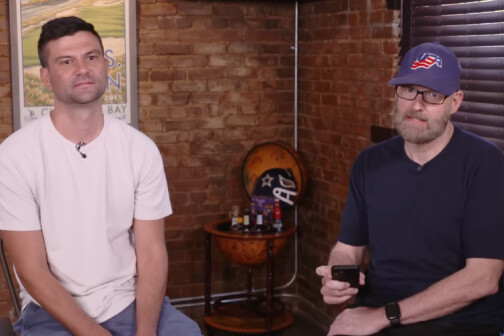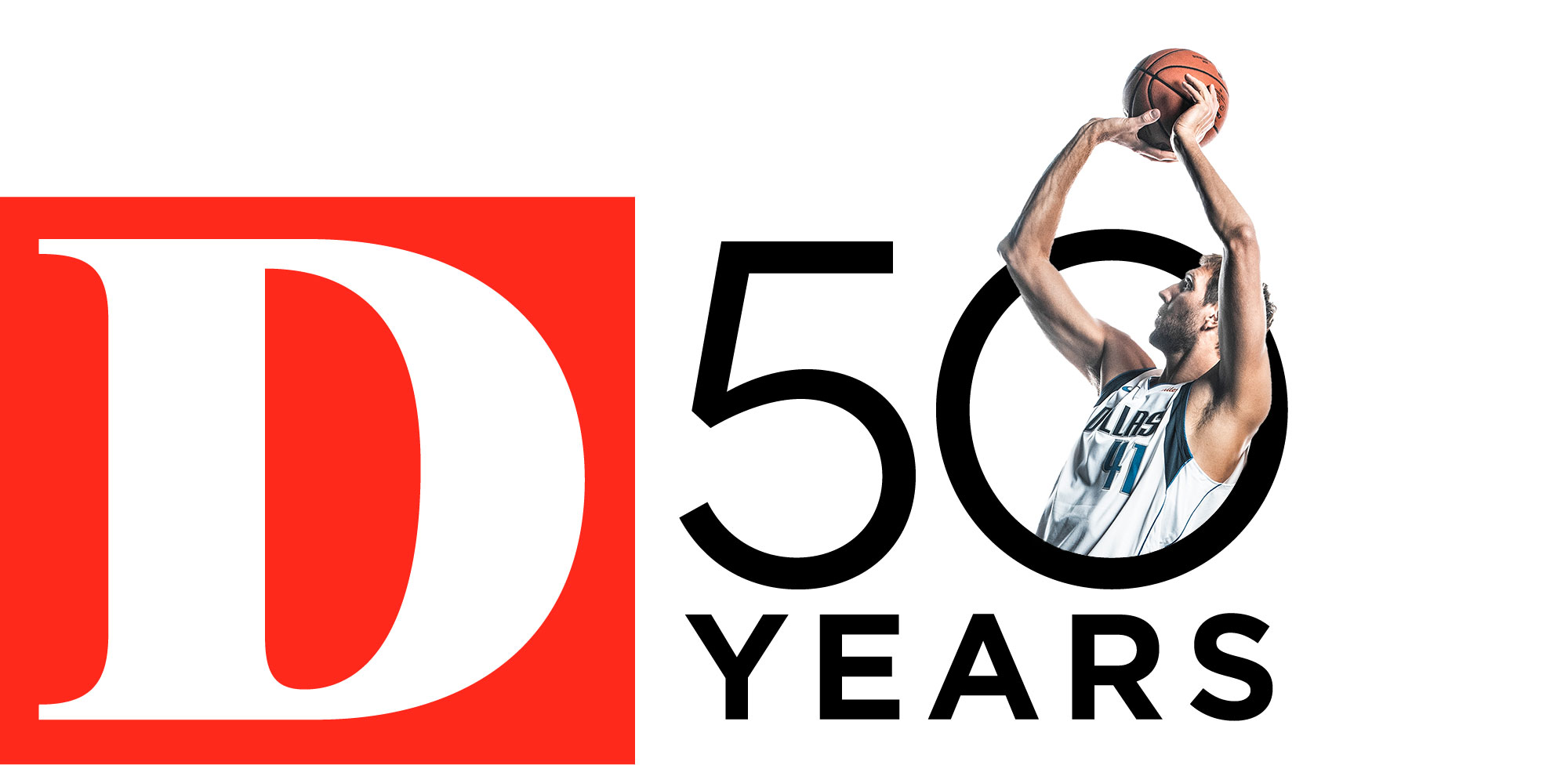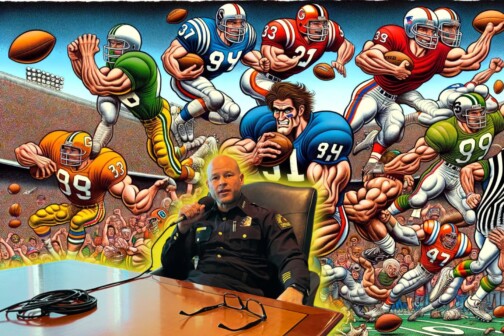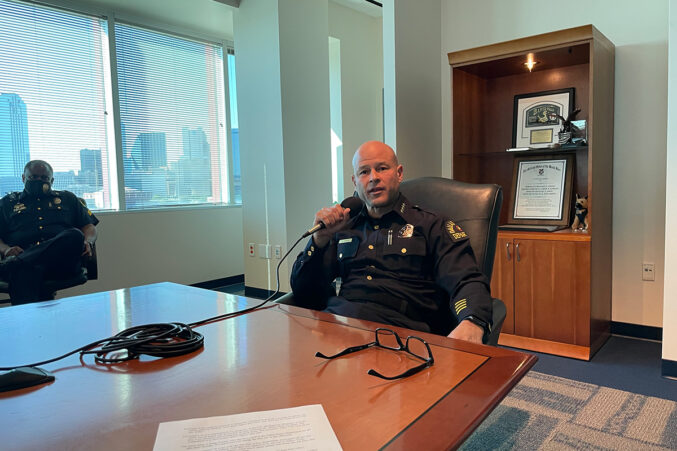A week ago, the parent company of The Ticket filed a lawsuit alleging that two of its ex-hosts, Dan McDowell and Jake Kemp, breached their contracts when they began a podcast a few days after they resigned from the station last month.
Susquehanna Radio, the parent company of Cumulus Media, filed the lawsuit August 4 in the U.S. District Court of the Northern District of Texas. The company claims the former Hang Zone hosts violated noncompete agreements they signed in 2018 when they launched their Patreon-based podcast called The Dumb Zone. (Disclosure: Kemp is also a freelance writer for D Magazine’s StrongSide sports section.)
The suit also accuses the two of taking over social media accounts previously belonging to The Hang Zone and repurposing them for their new endeavor.
The company says the new show focuses on “identical” subject matter and attracts the same audience. It alleges that the two are not complying with noncompete and anti-disparagement language in their contracts during their shows.
Susquehanna also asked Judge Karen Gren Scholer for a temporary restraining order and injunction to prevent McDowell and Kemp from producing more podcasts. On Wednesday, Scholer denied the initial request, which was an ex parte order, indicating that Susquehanna had not given Kemp and McDowell time to respond to the request.
“There are some orders that you can get ex parte, meaning that you don’t have to give the other side notice that you’ve filed suit,” says Wendell Washington, an employment law attorney with Valdez Washington LLP who agreed to speak generally about the case with D Magazine.
“This is what Cumulus was seeking here in their ex parte TRO,” he says. “They ran down to the court, they filed their TRO and had it heard, and didn’t give Dan and Jake or their attorneys notice.”
Washington said that Scholer’s ruling wasn’t on the merits of the case itself—that will come later. Instead, the decision was about whether Cumulus and Susquehanna had taken the correct steps for that particular request.
By Thursday, the duo’s attorneys — former Dallas City Councilman Philip Kingston and Matthew Bruenig—had filed a response to Susquehanna’s claims. Kemp and McDowell have also filed complaints against Cumulus with the National Labor Relations Board, alleging that the company’s non-compete and non-solicitation terms were overly broad. The complaint was later amended to include retaliation after the lawsuit was filed.
The response refutes several of the claims in Susquehanna’s filing, insisting that the podcast “does not compete” with their former station, and that they are complying with the terms of the contract in that respect. It also asserts that non-compete agreements are actually illegal under the National Labor Relations Act. Most of the allegations regarding disparagement and social media accounts, it says, were “made up from whole cloth” in retaliation.
The response also gives further insight into the contract negotiations with Cumulus. Much of the discussion focused on McDowell and Kemp’s desires to create something on their own—a podcast—that would generate revenue to supplement the paychecks for the crew of their show, who didn’t have the bargaining power McDowell and Kemp had. The response says that the two did not intend to compete with The Ticket, but instead create additional content. As negotiations continued, the two say Cumulus began insisting on terms for that content that would not allow the independence the duo wanted.
In the response, attorneys also question whether The Dumb Zone is truly in competition with The Ticket because it has no live audience, and no set schedule for regular updates. “Therefore, it cannot take calls from fans, break news, provide a traffic or weather report, or do any of the other temporal activities that live, terrestrial radio does.”
Kemp and McDowell’s lawyers point to the fact that other on-air talent at The Ticket have been able to create revenue-generating content on their own on podcasts, Twitch streams, and other avenues, including Kemp’s longstanding podcast It’s Just Banter that predates his time on The Hang Zone.
Susquehanna also alleges that the two breached their contract by taking over thehangzone.com site. Their lawyers say that McDowell, along with his former co-host Bob Sturm, were often forced to pay for websites and hosting fees out of their own pocket, “because Plaintiff would not.” McDowell and Sturm paid for a contractor to edit and publish their show podcasts, and Kemp later did the same thing with The Hang Zone, the response says.
“Plaintiff could have owned thehangzone.com but chose not to,” the lawyers say.
McDowell and Kemp talked to D extensively in one of the first interviews about their contract negotiations and the suit since it was filed. Both insist that they don’t harbor any ill-will toward their former employer. Our conversation, edited for length and clarity, is below.

The suit alleges that you were working on all of this prior to leaving the station. What can you tell me about the timeline when it came to the decision to start the podcast?
McDowell: The decision to start the podcast behind a paywall was made the weekend of July 22 and 23. (The two resigned on July 17). It was after a difficult week for us where we said goodbye to our co-workers. And really, once The Ticket was acknowledging our departure on the air, and The Musers did a segment, and The Hardline did a segment, it felt very official.
I think the 20th we released our little video—that was Thursday evening. We had informed our boss that we were gonna do that, just because everybody was coming at us and we weren’t doing anything on social media. And they said, “Okay.”
And when it came to the decision to start the podcast, we very deliberately decided to put it behind a paywall, and to not accept any advertising. And that’s because our intention was not to even have the slightest impression that we are trying to compete with The Ticket in any way, because we do have some kind of non-compete—a six-month non-compete. We wanted to honor that. Since we’ve started releasing shows, we’ve been approached by local businesses looking to sponsor us, and we’ve told them all, “We’ll get back to you, you know, next year sometime.”
Our best friends in the world work at The Ticket, and we want them to continue to succeed. We just want to kind of go do our own thing and let them keep continuing to rock.
Can you explain the sticking point in the contract negotiations? I know that the discussion on air over on The Ticket was about podcasting, and the response from your lawyers indicated that you also wanted to use the revenue to supplement the pay for your crew.
Kemp: We wanted to do our own thing on the side, and the entire emphasis of that was to generate revenue that we could provide to our crew.
Why start the podcast? Did you have any inkling that this might cause legal issues?
McDowell: I think we started releasing audio because we’re two narcissists and we think people would like to hear our voices, or maybe we just like to hear our own voices. We didn’t really anticipate this level of legal problems because we put it behind a paywall and we refuse to accept any advertising. We do not want to affect The Ticket’s ratings or revenue in any way. That’s the main goal.
Our lawyers and advisors were saying, “Yes, based on the way your contract is written, this is a viable option for you.” And apparently, it was interpreted in a different way.
And to be clear, you’re not really fighting your non-compete, in your eyes.
McDowell: We kind of thought we were trying to adhere to what we’re interpreting that it says. If we were fighting it, we’d be wanting to jump on a commercial radio station.
What has the reception been like for the podcast?
McDowell: Well, from certain companies it hasn’t been good. But I think in general, it’s been positive. It’s been strong to quite strong.
Are there any hard feelings with The Ticket?
McDowell: I would say absolutely not. And even though we’re the targets of a lawsuit, we don’t have hard feelings with the company that owns The Ticket either. You know, they’re a business. They’re making a business decision not to re-sign us to a contract. They made a business decision to sue us. We made our decision, too. I don’t have hard feelings over anything. I’m just trying to do our own thing and move forward.
Kemp: The thing that I want to add to that is that it’s not just not hard feelings, it’s positive feelings. Many of the people who work for The Ticket are my closest friends in the world. I became an adult working at this radio station. Not only the on-air talent but our boss, Jeff Catlin, has been extremely supportive of me and it’s both personal and professional. These are people who were at my wedding—even though Corby showed up very underdressed. I love them. I will always love them. I hope no will ill will against any of them, so it’s not just no hard feelings. It is positive feelings. And I think that’s very important to us.
What if Cumulus is successful in getting the injunction?
Kemp: That would be unfortunate but that’s not really our thing. Like, that’s up to people that are way, way smarter than us.
McDowell: I mean, I’ve been scared straight. I’m not going to do anything law tells me I can’t do. I’m more of a “Yes, sir” guy than Jake is.
Can you kind of describe what kind of radio town Dallas is? What is the audience like?
Kemp: I think there are a couple of different things at play there. I think part of it is that most everyone here has a commute in their car. We have this ridiculous amount of sprawl and a significant number of people have to commute. And we have sports teams that people are very passionate about. And the third element of that I would say is that somehow it seems that Dallas-Fort Worth ends up being national news a lot.
I think it’s a great radio market and I think The Ticket has perfectly captured that, and it will continue to do so.
The other day someone said to me that part of the reason they enjoy listening to The Ticket is that the on-air talent seems really relatable, like they could be a friend. Do you think that’s part of the success?
Kemp: I think it’s absolutely the case. I mean, I’ve been through a number of personal situations—most recently, my son had a surgery done to his head a couple of months after he was born. The response to that, from a personal standpoint, was moving. People were so responsive in a positive way. I actually ended up finding the surgeon that did his procedure via those responses. I think it’s something very special, and I think we’re just proud to be a part of it.
Author






